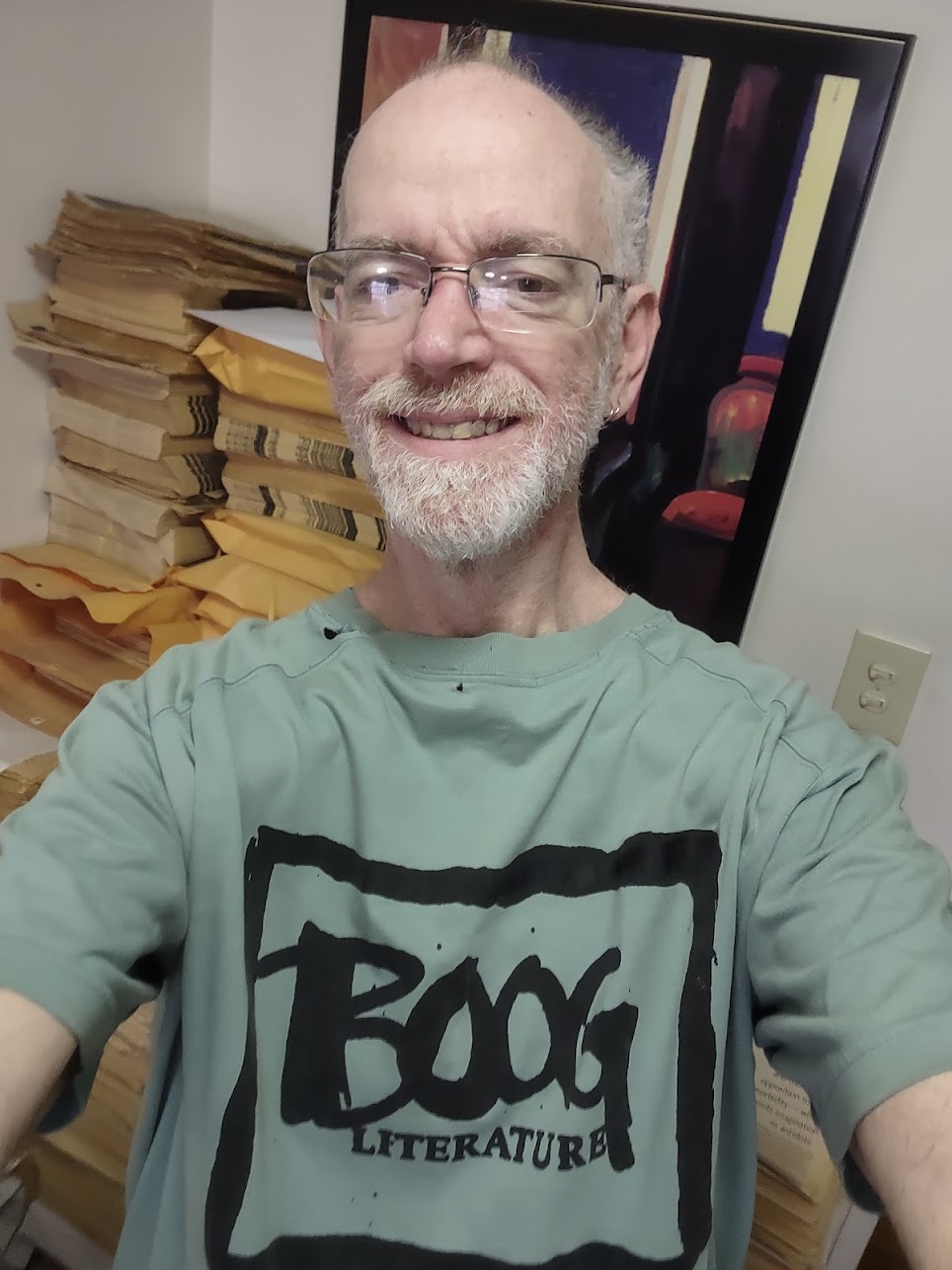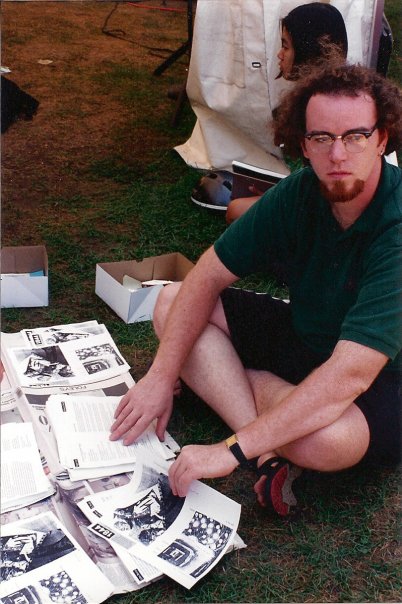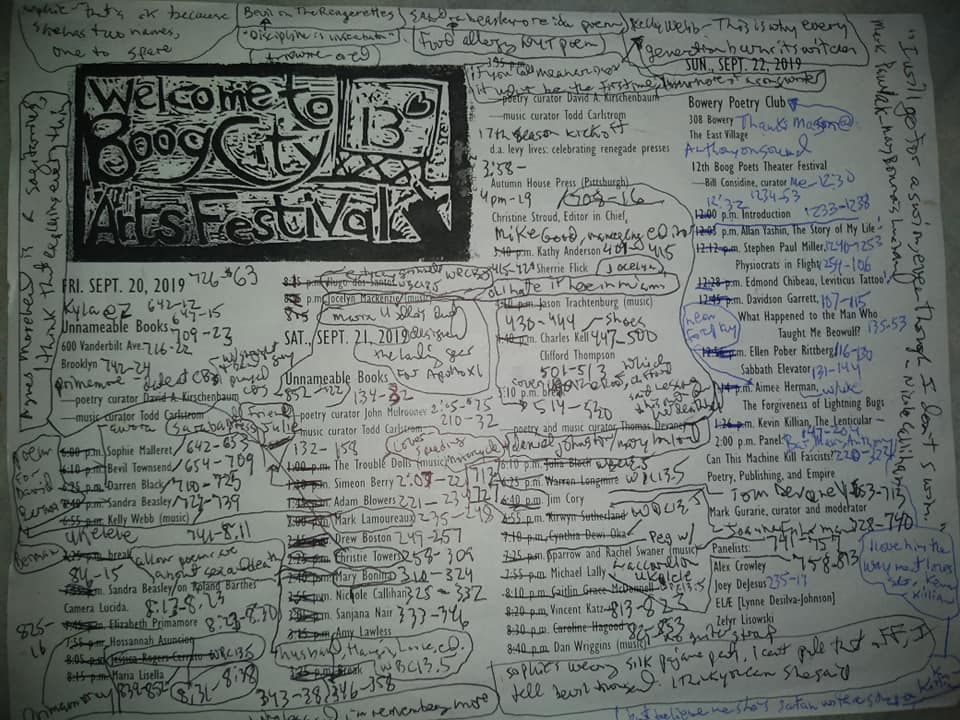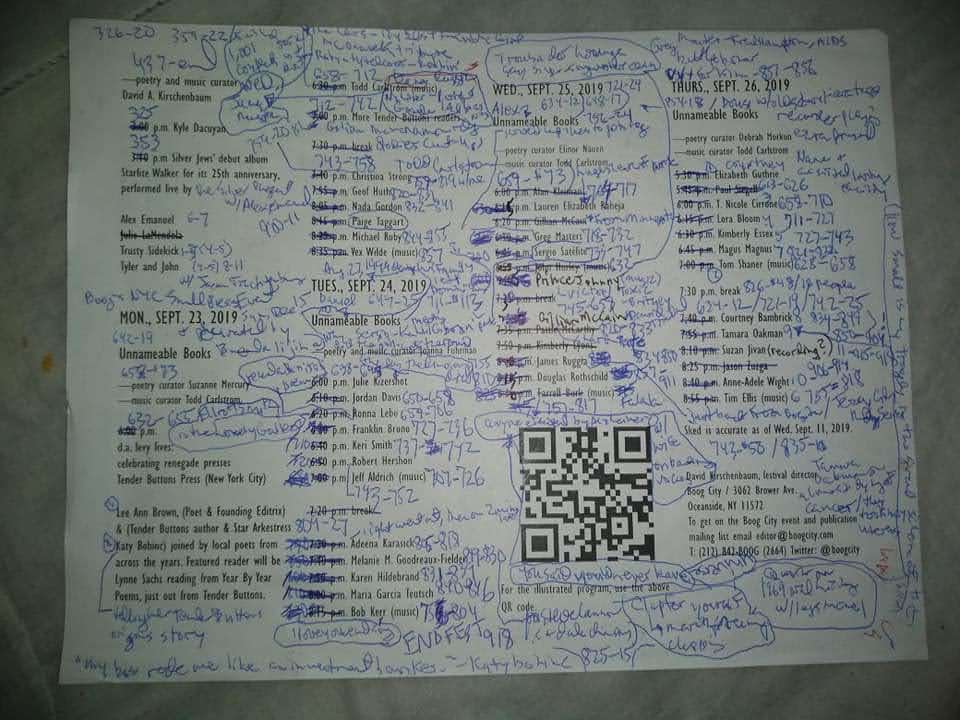by Susan Visakowitz
“I think about [Boog] as a life-long project,” says editor, publisher, and chief mastermind David A. Kirschenbaum of Boog City, which celebrates an astounding 30 years this month of offering refuge to underground American poets, musicians, visual artists, and other “unsung artistic heroes.”
 Boog has shapeshifted several times over that period, manifesting first as a micromini chapbook publisher and zine, then as a physical newspaper, and now as a digital publication. Along the way, Boog became an event curator, too—hosting everything from the beloved Classic Albums Live series, where several musical acts perform one revered album in an evening, to the sprawling Welcome to Boog City festival, where you are just as likely to hear a poetry reading as to watch a film, see a band, or catch some poets theater over the course of three to seven multi-faceted days.
Boog has shapeshifted several times over that period, manifesting first as a micromini chapbook publisher and zine, then as a physical newspaper, and now as a digital publication. Along the way, Boog became an event curator, too—hosting everything from the beloved Classic Albums Live series, where several musical acts perform one revered album in an evening, to the sprawling Welcome to Boog City festival, where you are just as likely to hear a poetry reading as to watch a film, see a band, or catch some poets theater over the course of three to seven multi-faceted days.
Boog thusly reflects the varied interests of its inimitable but humble leader. Says the matter-of-fact Kirschenbaum, “It’s just something I enjoy doing: getting the word out about my friends and artists and musicians and writers.”
You can read all about the fascinating origins, twisty-turny evolutions, and storied early highlights of Boog City in a meaty interview Kirschenbaum did with Joe Pan in 2016 on the occasion of Boog’s 25th anniversary (http://www.boogcity.com/boogpdfs/bc108.pdf). So, for this discussion, I asked David to focus in on the last 5 years, a time that has been impacted by the continued decline of ad revenue for publishers, the COVID-19 pandemic, and the reflection that’s inevitable when you reach a milestone like “30th anniversary.”
What struck me is that through it all, Kirschenbaum remains at heart a giddy and devoted fan, as excited now to talk about poetry, comics, and music as I imagine he was when he first started putting Boog together with his friend Rod Sperry as two fresh-out-of-college kids ready to take on the world armed with nothing but a long-arm Bostich stapler, a teaspoon or cassette tape to smooth the spines, and a dogged dedication to doing things differently.
What follows here is a transcript of our recent chat, condensed and lightly edited for clarity.
Boog City: So, David, tell me what it feels like to be on the cusp of the 30-year anniversary of Boog City.
Kirschenbaum: It has me reflecting on everything. Whenever I talk about the press, I think about it as a life-long project, not something that has an end date—until I have an end date. It’s just something I enjoy doing: getting the word out about my friends and artists and musicians and writers. It also shows that people like what I’ve been doing all these years.
I guess a big part of this whole thing is trust. I’ve been grateful that all of these people have entrusted themselves to me, in a printed way, in a digital way, in a live way. For creators, this is who you are, so for you to trust anybody with it is hard. So, for me to have people who I have continued to have a relationship with and continued to publish throughout these 30 years, it makes me very happy that they trust me and that they like what I do.
Boog City: There’s been a lot of change when it comes to publishing over the years and I know it’s not always an easy world to be in. How do you stay motivated?

Kirschenbaum: I like the recipe I have right now. I’ve always from the beginning mixed up music and poetry and other things as much as I can. As long as I continue to mix it up I’m happy.
Also, over the years when I’ve heard other presses are going to be stopping, I always backchannel them with a note that says: “The press doesn’t run you, you run the press. There’s nothing saying you have to continue at the same output.” There were times for me at Boog where I could only put out a postcard in a four-month period, so I put out a postcard, and then when I was ready I returned to a higher output. There’s no reason to burn yourself out.
Boog City: What impact has the pandemic had, especially given the prominent role of live events for Boog?
Kirschenbaum: I was resistant at the beginning of COVID to do anything digitally. I was hoping COVID would be under control sooner, so I just didn’t do anything. But then, come last September, I finally said, “Ya know what, let’s do something.” So, in September we did a one-shot, four- to five-hour event for our Welcome to Boog City festival, which usually goes four to seven days.
We had some poetry, some theater, some film. We did everything we love to do, because I really believe the variety gets everything else enjoyed more. And a big part of making it happen was my friend Suzanne Mercury. She has helped with booking Welcome to Boog City in the past and has been a reader at the festival, too. But she’s also been involved with the Boston Poetry Marathon, and last August they did a three-day long, all-digital fest. So, she helped me figure out how to do my festival in an all digital format.
We’re doing a 30th anniversary event [on Aug. 5] that will be part remote and part live and we have to figure out how we’re going to be doing that. We’ve got 10 readers (just because that’s who I wanted to book): 5 are from out of state, 1 is still not quite sure about reading in person, and the others will hopefully be in person. We also have the band Schwervon!, who are going to play a half-hour set from Kansas. And it’s wonderful we can get people like that [remotely] because before we weren’t able to.
I should mention, we switched over to being a website a year ago, but it wasn’t really because of the pandemic—that was part of it, but it was really because of computer problems I was having and because people had been telling me to do so for a while, anyway.
We had done chapbooks and zines from 1991-2002. Then in 2002 we became a physical newspaper that was distributed around lower Manhattan, and Williamsburg and Greenpoint, Brooklyn. And then when ad revenue dried up we just did the paper the same way, but uploaded it as a PDF instead of printing it.
So, finally, last year, really for practical reasons, we began to switch from doing the paper as a PDF to being a website. I refer to it as “the paper at the website.”

 Boog City: Tell me about a few of the highlights of the past five years.
Boog City: Tell me about a few of the highlights of the past five years.
Kirschenbaum: I’d always wanted to do a seven-day festival. I didn’t think it was wise, but I wanted to try it anyway. And we did it and I loved it. It was a lot of fun, it was hectic, it was non-stop.
One of the things that was nice: for the first seven years of the festivals, I organized all of it myself and I would book the 50-100 performers I needed depending on how long the festival was going to be, in part asking friends for booking recommendations.
Then I decided to divide up the curating, which opened it up to more distinct vantage points being covered. For years I did that and I would tell people, “Give me your top ordered dates,” and we’d try to give everyone their highest choice possible. But then, a few years ago, I gave every curator a specific chunk of time: someone had Friday night, two people took Saturday, another two for Sunday, and Monday-Thursday was one person each. I now have a consistent team of bookers that I’ve had for the last three to four years, and it’s been nice. I realized as long as they provide variety, you don’t need to get somebody in [as a booker] just to get somebody in.
And we’ve done some great Classic Albums Live shows, too. Todd Carlstrom, who has been playing Boog shows for close to two decades as Limp Richard, the lead guitarist for The Domestics, and frontman for his own Todd Carlstrom and the Clamour, has been booking the music for the past three years. Todd’s booked a ton of great musical acts to do their own sets, and under his direction we’ve performed Tom Petty’s Full Moon Fever for its 30th anniversary, U2’s debut Boy on St. Patrick’s Day, Elastica’s eponymous debut album for its 25th anniversary, The Go-Go’s, Beauty and the Beat for its 40th anniversary, and The Muffs eponymous debut for the 30th anniversary of the formation of the band.
Todd’s about to perform at our 30th anniversary event as Todd Carlstrom and Friends with a live performance of Robyn Hitchcock and the Egyptians’ Globe of Frogs, someone who Todd’s covered through the years he’s played Boog shows. In the fall we’re going to do Nirvana’s Nevermind for the fourth time—this kicked off the series in ’02 at the Knitting Factory, and I thought we should do it again 20 years into this series and on the 30th anniversary of the album’s release to begin the Welcome to Boog City 15 Arts Festival. We’ll close out the year with Led Zeppelin IV for the 50th anniversary of its release.
Boog City: What’s coming up next?
Kirschenbaum: For the 30th anniversary, I thought it would be nice to revisit our roots and do some chapbooks. During quarantine, I was going through my archives and it was nice to see the different shapes and sizes of everything we’ve done over the years. It was a nice trip down memory lane.
We have some manuscripts for chapbooks ready from Anselm Berrigan, Wanda Phipps, and Ed Sanders. The hope is to have these out in time for the holiday shopping season. 🙂
Since last August, when we switched over to being a website, Wanda has served as our fiction editor, and the great work she’s been gathering has spurred me to think about nonfiction prose again. People are showing interest in that kind of work, and in many ways we’ve been covering nonfiction prose in a lot of these [small press] interviews and in printed matter. But I’d like to get some stuff that’s kind of like memoir—I hate to call it that, because that’s so chic—but stories about another time, what they’ve done over the years, and so on—because all these folks in our communities have great lessons to share.
I was also going through the digital archives to see what’s left to digitize, and I had this idea for a series years ago called BoogWork. One person would give a workshop and do a reading, two 10-minute readings, and then a poet they selected would read for 10-15 minutes, a musical group would play for 30 minutes, and then there’d be a workshop run by the featured poet for 30 minutes. And the idea would be that the audience would exit not only with some work, but with ideas on how to proceed with their work on their own. So, basically, a way to help spur things. We also did this as part of the Welcome to Boog City festival, where one of the readers led a workshop, and I’d really love to do a workshop again in some form.
Boog City: Any final thoughts?
One of [Boog’s] first catchphrases was, “Get the word out”—meaning, let’s spread the word about people that people should know about but don’t. Not for monetary reasons or anything else, but because their work is wonderful. It’s really about: “You should hear how this person plays the drums” or “how this person reads.”
To be a part of an arts community, from Albany to the city to nationwide because of the Internet—it’s been wonderful. I’m so happy.
https://wordpress.boogcity.com/
DAVID A. KIRSCHENBAUM (www.myspace.com/gilmoreboysmusic) is the author of The July Project 2007 (Open 24 Hours), a series of songs about Star Wars set to rock and pop classics. His work has appeared in the Brooklyn Rail, the Brooklyn Review Online, Chain, and The Village Voice, among others. He is the editor and publisher of Boog City, a New York City-based small press and community newspaper now in its 30th year. His Gilmore girls tinged poems form the lyrics of Preston Spurlock and Casey Holford’s band Gilmore boys.
 SUSAN VISAKOWITZ (www.instagram.com/exiting_in/) is a poet and painter who loves to tell the stories of fellow creative types. She got her start reporting on music for various small blogs and eventually publications like Billboard magazine. Currently she is focused on a new series of art projects under the name Exiting In.
SUSAN VISAKOWITZ (www.instagram.com/exiting_in/) is a poet and painter who loves to tell the stories of fellow creative types. She got her start reporting on music for various small blogs and eventually publications like Billboard magazine. Currently she is focused on a new series of art projects under the name Exiting In.

